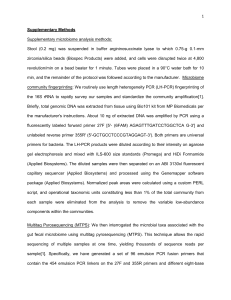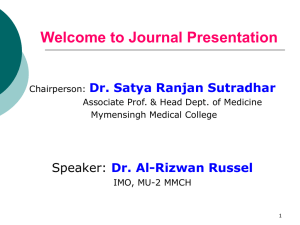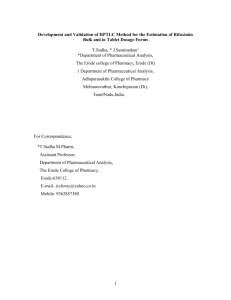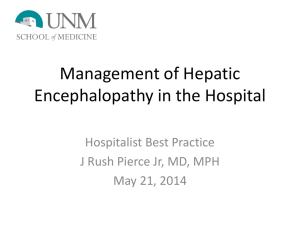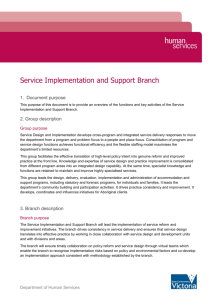Rifaximin - Centre for Medicines Optimisation
advertisement
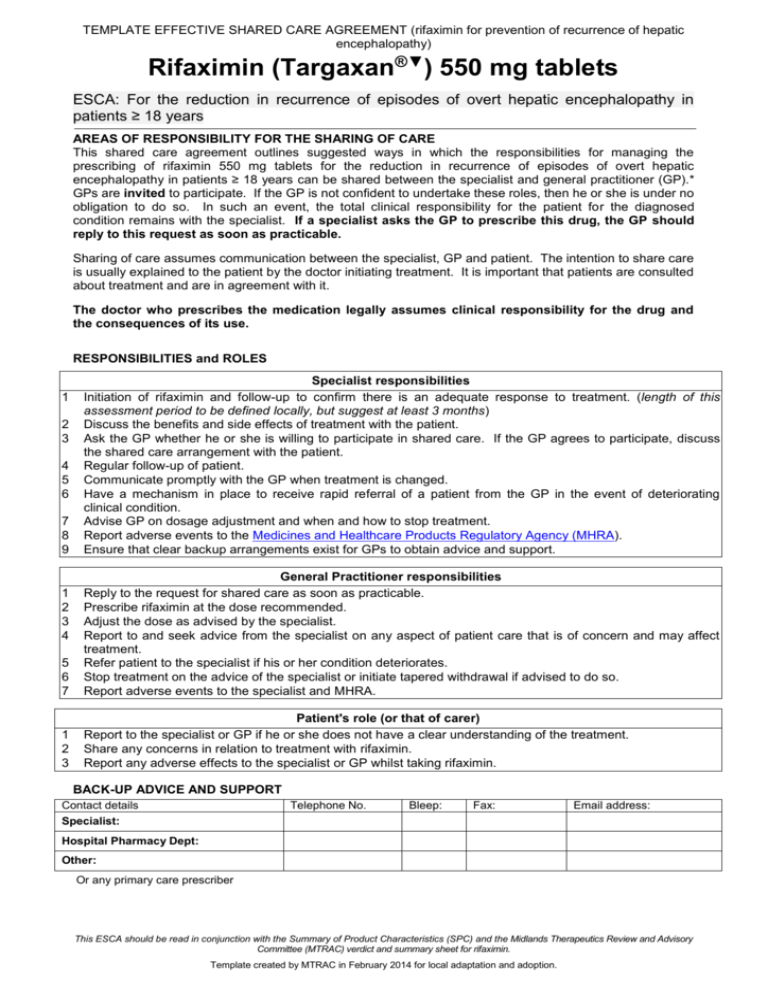
TEMPLATE EFFECTIVE SHARED CARE AGREEMENT (rifaximin for prevention of recurrence of hepatic encephalopathy) Rifaximin (Targaxan®▼) 550 mg tablets ESCA: For the reduction in recurrence of episodes of overt hepatic encephalopathy in patients ≥ 18 years AREAS OF RESPONSIBILITY FOR THE SHARING OF CARE This shared care agreement outlines suggested ways in which the responsibilities for managing the prescribing of rifaximin 550 mg tablets for the reduction in recurrence of episodes of overt hepatic encephalopathy in patients ≥ 18 years can be shared between the specialist and general practitioner (GP).* GPs are invited to participate. If the GP is not confident to undertake these roles, then he or she is under no obligation to do so. In such an event, the total clinical responsibility for the patient for the diagnosed condition remains with the specialist. If a specialist asks the GP to prescribe this drug, the GP should reply to this request as soon as practicable. Sharing of care assumes communication between the specialist, GP and patient. The intention to share care is usually explained to the patient by the doctor initiating treatment. It is important that patients are consulted about treatment and are in agreement with it. The doctor who prescribes the medication legally assumes clinical responsibility for the drug and the consequences of its use. RESPONSIBILITIES and ROLES 1 2 3 4 5 6 7 8 9 Specialist responsibilities Initiation of rifaximin and follow-up to confirm there is an adequate response to treatment. (length of this assessment period to be defined locally, but suggest at least 3 months) Discuss the benefits and side effects of treatment with the patient. Ask the GP whether he or she is willing to participate in shared care. If the GP agrees to participate, discuss the shared care arrangement with the patient. Regular follow-up of patient. Communicate promptly with the GP when treatment is changed. Have a mechanism in place to receive rapid referral of a patient from the GP in the event of deteriorating clinical condition. Advise GP on dosage adjustment and when and how to stop treatment. Report adverse events to the Medicines and Healthcare Products Regulatory Agency (MHRA). Ensure that clear backup arrangements exist for GPs to obtain advice and support. 5 6 7 General Practitioner responsibilities Reply to the request for shared care as soon as practicable. Prescribe rifaximin at the dose recommended. Adjust the dose as advised by the specialist. Report to and seek advice from the specialist on any aspect of patient care that is of concern and may affect treatment. Refer patient to the specialist if his or her condition deteriorates. Stop treatment on the advice of the specialist or initiate tapered withdrawal if advised to do so. Report adverse events to the specialist and MHRA. 1 2 3 Patient's role (or that of carer) Report to the specialist or GP if he or she does not have a clear understanding of the treatment. Share any concerns in relation to treatment with rifaximin. Report any adverse effects to the specialist or GP whilst taking rifaximin. 1 2 3 4 BACK-UP ADVICE AND SUPPORT Contact details Specialist: Telephone No. Bleep: Fax: Email address: Hospital Pharmacy Dept: Other: Or any primary care prescriber This ESCA should be read in conjunction with the Summary of Product Characteristics (SPC) and the Midlands Therapeutics Review and Advisory Committee (MTRAC) verdict and summary sheet for rifaximin. Template created by MTRAC in February 2014 for local adaptation and adoption. TEMPLATE EFFECTIVE SHARED CARE AGREEMENT (rifaximin for prevention of recurrence of hepatic encephalopathy) SUPPORTING INFORMATION Licensed indication Rifaximin 550 mg tablets are indicated for the reduction in recurrence of episodes of overt hepatic encephalopathy in patients ≥ 18 years of age. The Summary of Product Characteristics (SPC) advises that in the pivotal study, 91% of the patients were using concomitant lactulose. Consideration should also be given to official guidance on the appropriate use of antibacterial agents. Dosage and Administration The recommended dose is one 550 mg tablet, twice a day. The clinical benefit was established from a controlled study in which subjects were treated for 6 months. Treatment beyond 6 months should take into consideration the individual balance between benefits and risks, including those associated with the progression of hepatic dysfunction. Rifaximin can be administered with or without food, and should be given with a glass of water. Monitoring The SPC does not identify any specific monitoring requirements for this drug. Contraindications and precautions for use Contraindications: Hypersensitivity to rifaximin, rifamycin-derivatives or to any of the product’s excipients. Cases of intestinal obstruction Special warnings/precautions: The potential association of rifaximin treatment with Clostridium difficile-associated disease and pseudomembranous colitis cannot be ruled out. Concomitant administration of rifaximin with other rifamycins is not recommended. Patients should be informed that despite the negligible absorption, in common with other rifamycins, rifaximin may cause a reddish discolouration of the urine. Hepatic Impairment: use with caution in patients with severe (Child-Pugh C) hepatic impairment and in patients with MELD (Model for End-Stage Liver Disease) score > 25. Whilst interactions have not been commonly reported, the use of additional contraceptive precautions is recommended, in particular if the oral contraceptive oestrogen content is below <50 micrograms. Therapeutic Use Refer to MTRAC verdict and summary sheet for rifaximin 550 mg tablets Side Effects Common adverse events (occurring in ≥1/100 to <1/10 of patients) as listed in the SPC: depression; dizziness; headache; dyspnoea; abdominal pain and distension; diarrhoea, nausea, vomiting, ascites, rashes, pruritus, mucle spasms, arthralgia, peripheral oedema. See SPC for full details of adverse events. Rifaximin was launched in 2013 and has black triangle (▼) status. All suspected reactions (including those considered not to be serious and even where the causal link is uncertain) should be reported to the MHRA. Drug Interactions The SPC states that whilst studies in healthy subjects have shown no significant interaction, in hepatic impaired patients it cannot be excluded that rifaximin may decrease the exposure of concomitant CYP3A4 substrates administered (e.g. warfarin, antiepileptics, antiarrhythmics). An in vitro study has suggested that rifaximin is a moderate substrate of P-glycoprotein(P-gp) and is metabolized by CYP3A4. It is unknown whether concomitant drugs which inhibit P-gp and/or CYP3A4 can increase systemic exposure of rifaximin. Cost At current prices, the cost of one year’s treatment with rifaximin 550 mg tablets (one table, twice daily) is £3379 (Drug Tariff, Mar-14). References MTRAC verdict and summary sheet for rifaximin for prevention of recurrence of episodes of overt hepatic encephalopathy (Jan-14) Targaxan (rifaximin) 550 mg film-coated tablets. Norgine Limited. Summary of Product Characteristics. 2013 (available at https://www.medicines.org.uk/emc/). This ESCA should be read in conjunction with the Summary of Product Characteristics (SPC) and the Midlands Therapeutics Review and Advisory Committee (MTRAC) verdict and summary sheet for rifaximin. Template created by MTRAC in February 2014 for local adaptation and adoption.

